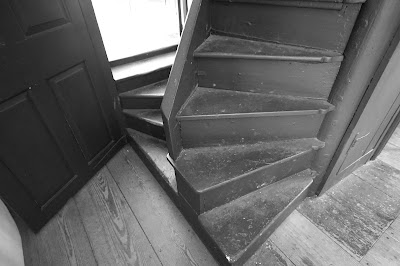Joan Wickersham in person, Kelly Writers House as refuge
Saturday, April 23, 2016
I would have preferred a sharper photo. I could blame my fatigue at the near end of that day—my hands slipping, or my eyes watering, or something. Instead, I'll declare this photograph of Joan Wickersham reading at Penn's Kelly Writers House to be infused by the light Joan carries with her. As she works. As she reads. As she considers. As she listens.
Joan was at Penn to read from three works—nonfiction (The Suicide Index), fiction (The News from Spain), and poetry (Vasa Pieces, parts of which appear in Agni 82). Her coming was, for me, a highlight of this semester—a chance to hear from a writer whose work has long inspired and thrilled me. A chance, too, thanks to Joan's invitation, to spend an hour or so alone with her over steeping, seeping cups of berry tea. We talked advertising youths, Lab Girl, place in memoir, the confounding role of adjunct teachers, Philadelphia then and now. I discovered, in Joan, that rare, wonderful thing: a person as gloriously complex and broadly thinking in person as she is on the page.
And then there she was, reading. Words I'd read twice, sometimes three times before, but delivered newly. A culminating sequence from Vasa Pieces—new work inspired by the sinking and resurrection of the Swedish warship, Vasa. Beautiful pieces made thrilling by their emergence from history and their threads of urgent now. The first poem setting the tone, revealing the "must" of this work—the role the Vasa played in the imagination of Joan's husband:
Until Joan lifted her head. And even then, her spell was not broken. The light still broke behind and through her.
I want to thank my students who attended for allowing this moment into their lives. I want to thank Jamie-Lee Josselyn, that lovely vision in green pants, for her beautiful introduction. I want to thank the Kelly Writers House for being home and hearth to both talent and soul, for being that place that students can and do turn to when the world feels raw and bright minds are the cure.
I want to thank Joan for the afternoon, and for the inspiration of her commitment to the work itself. The work, above and beyond all else. Read more...
Joan was at Penn to read from three works—nonfiction (The Suicide Index), fiction (The News from Spain), and poetry (Vasa Pieces, parts of which appear in Agni 82). Her coming was, for me, a highlight of this semester—a chance to hear from a writer whose work has long inspired and thrilled me. A chance, too, thanks to Joan's invitation, to spend an hour or so alone with her over steeping, seeping cups of berry tea. We talked advertising youths, Lab Girl, place in memoir, the confounding role of adjunct teachers, Philadelphia then and now. I discovered, in Joan, that rare, wonderful thing: a person as gloriously complex and broadly thinking in person as she is on the page.
And then there she was, reading. Words I'd read twice, sometimes three times before, but delivered newly. A culminating sequence from Vasa Pieces—new work inspired by the sinking and resurrection of the Swedish warship, Vasa. Beautiful pieces made thrilling by their emergence from history and their threads of urgent now. The first poem setting the tone, revealing the "must" of this work—the role the Vasa played in the imagination of Joan's husband:
... I imagine you down there,Poems continuing on through ships (and lives) gone wrong, through autobiographies redesigned by survivors, through shipworms and felt absence.
reading and re-reading the story of Vasa,
memorizing every picture, puzzling over the order—
the heeling ship, the sinking ship, the risen ship,
the sunken ship, the battered risen ship again—
clinging to the table leg, pretending it was a mast.
Until Joan lifted her head. And even then, her spell was not broken. The light still broke behind and through her.
I want to thank my students who attended for allowing this moment into their lives. I want to thank Jamie-Lee Josselyn, that lovely vision in green pants, for her beautiful introduction. I want to thank the Kelly Writers House for being home and hearth to both talent and soul, for being that place that students can and do turn to when the world feels raw and bright minds are the cure.
I want to thank Joan for the afternoon, and for the inspiration of her commitment to the work itself. The work, above and beyond all else. Read more...





















